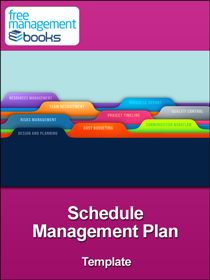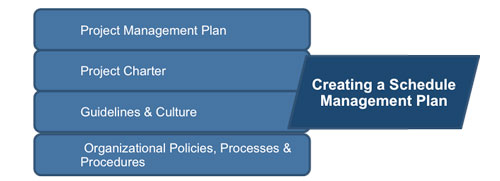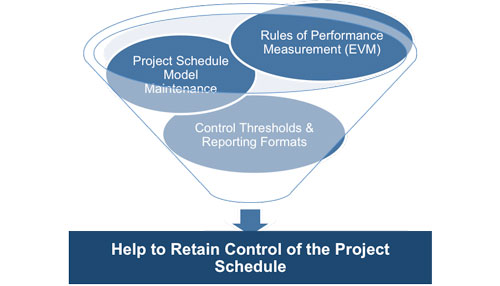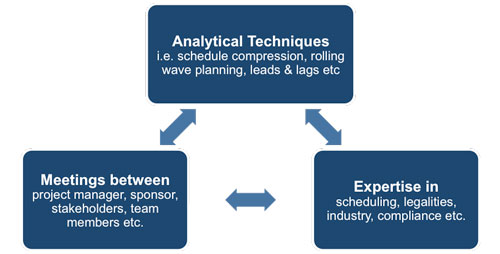
Schedule Management Plan Template
This schedule management plan template allows you to create an appropriate schedule management plan in sufficient detail for your project.
It defines for each project resource how it will be measured, the guidelines of performance measurement, level of accuracy and control thresholds that are acceptable for this project. The work breakdown structure (WBS) document plays a key role in producing the schedule management plan as it defines the manageable chunks of work required for each deliverable once approved these create the project scope baseline.
This plan outlines the precise nature and objective of the project explaining how it benefits the organization. It also defines which individuals must be involved in this process and states whose approval is needed to progress the project. The schedule management plan guarantees that everyone linked with the project has the same understanding of the project’s purpose and the benefits it brings to the organization.
In order to create the project schedule there must be a clear and detailed understanding of the end-users’ requirements. The schedule plan defines what and how the end product or service is created and whose approval is required for this plan to become part of the project documentation.
There are several aspects to developing a project schedule, the project plan and the project charter are essential. But you must not forget to incorporate the cultural influences, policies, procedures, guidelines and processes of the organization.

An overview of the project is detailed in the project charter to which you need to gain the approval of the project stakeholders to the defined project deliverables and the work packages of the work breakdown structure (WBS) document and WBS dictionary. The process for gaining this approval involves creating a stakeholder register in which each stakeholder’s level of interest, influence and importance is clearly documented. Once the agreement of relevant stakeholders is attained the project scope becomes verified.
Communication plays a key role in a project’s ultimate success and the schedule management plan is no exception. It clearly states what reports should be produced, how often and to whom they must be distributed to. These communications and reports have a crucial part to play in ensuring the end product meets the expectations of the project stakeholders and the organization.
This plan also defines and documents any project assumptions, constraints and exclusions that have been agreed upon and have been taken into consideration in the project decisions making process for this area of project management. All projects will be affected by changes as the work progresses they key to success is managing and controlling such changes within a predefined process before any work begins.

The schedule management plan defines the roles and responsibilities as they relate to the project time management. The plan outlines the roles of the project manager, project sponsor, relevant stakeholders and certain members of the project team have in the definition of individual work packages. This includes estimating the resources and time needed for each work packages and their sequencing throughout the project life cycle.
A significant amount of this management plan is devoted to describing how changes to the project schedule will presented, evidenced, assessed and approved. All projects will have schedule milestones that are defined within the description of how this knowledge area will be managed. This includes such items as:
• Finalized scope statement
• Project schedule baseline approval
• Work breakdown structure (WBS) & WBS dictionary
• Sign-off of project budget
• Approval of requirements definition
• Agreement of roles & responsibilities
• Project implementation & acceptance of final deliverables
Good project managers will use a combination of three tools when creating a schedule management plan. Due to the complexity and specialization that frequents most projects the need to call on subject matter experts is paramount. This means calling a wide variety of meetings to which these experts are invited for the knowledge they bring to the project and its essential input into the decision making process. The third and final tool is the use of analytical techniques that have been specifically designed to assist in estimating approaches of time and resources as well as and designing the schedule itself.

The most commonly used analytical techniques are:
• Alternatives analysis
• Leads and lags
• Reviewing schedule performance
• Rolling wave planning
• Schedule compression
Considerable skill and experience is needed to create a sequence of project activities that are able to use the resources and time in the most effective way to ensure a projects success. Being able to identify the exact nature of relationship between activities within each work package and recognize any dependent activities is essential when defining a project schedule. Without a well planned and thought out project schedule resources, costs and time will be poorly managed and project objectives hard to achieve.
